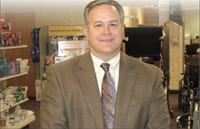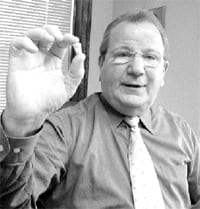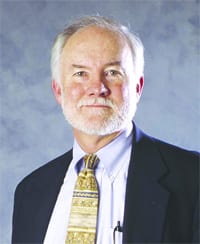Moving Parts Agawam Medical Supply Grows Regionally — and Online
When Dean Saracino purchased Agawam Medical Supply in 1994, he had already been working in the medical-equipment field for about two decades, and felt he had seen plenty of changes in that time.
But he had no idea what was to come, as advancing technology, insurance changes, and consumers’ increasing taste for the online retail experience posed plenty of challenges — but also opportunities.
Saracino, along with co-owner Jane Cutler, has certainly risen to those challenges, and then some.
“At the time I bought it, this was a very small company,” he said, “and now we have three locations — this one; A&A Medical Supply in Acton, Mass.; and Connecticut Medical Supply in Enfield. And we’re getting ready to launch a new company, a national Web site called 24/7 Medical Supply, which will go live on June 14.”
The company’s main focus has always been durable medical equipment — wheelchairs, hospital beds, oxygen tanks, and the like — but has moved into many specialty areas as well, from compression garments for lymphedemas to mastectomy supplies — really, “we sell anything medical,” as Saracino put it.
In doing so, he and Cutler have built what has become one of the largest medical-equipment companies in Massachusetts; Agawam Medical Supply handles distribution to customers west of Worcester and south into Connecticut, while A&A, headed by Cutler, distributes in the eastern half of the state. And this month, the business will make its foray into e-commerce.
“The reason we’re going to a 24/7 Web site is because technology is changing, and people are going on computers to shop,” he said of 24-7medicalsupply.com. “Even a lot of Baby Boomers are very computer-savvy, and they’re looking up equipment on Web sites and want to purchase it from their home.
“Say, for instance, I’m taking care of my mother, and live two states over,” he continued. “I can’t be over there to see her, but I can go online, view a product, and e-mail her about the product to get her OK on it. Then I click a button, and two days later, the equipment shows up at her house.”
Saracino said he has connected with a nationwide network of distribution companies. “Depending on where you live, we ship directly from a distribution site to your home within three days.”
This month, HCN sits down with one of the region’s medical business success stories to talk about how his company has grown and what opportunities he sees around the corner in what remains a rapidly changing field.
Opportunity Knocks
Saracino first got into the medical-equipment field in the mid-’70s, working part-time for a medical-supply business throughout college. “And I just stuck with it,” he said. “It’s what I knew. I saw a lot of changes over the years and worked for a lot of large companies. When the opportunity came up to buy Agawam Medical Supply and start this corporation, it excited me to be on my own, doing my thing according to how I saw the business and the direction it was going.”
Since then, he’s built an extensive customer base of hospitals, nursing homes, private physician practices, dentists, the public — basically anyone who uses medical supplies, he said. And keeping business strong means aggressively pursuing promising trends.
For example, “we’re the largest hospice supplier in the state of Massachusetts; we work with the hospices, and our trucks are running 24/7,” he said, noting that hospice care is a fast-growing market for wheelchairs, oxygen supplies, wound-care supplies, and hospital beds, including low-air-loss beds and pressure-relieving cushions and mattresses.
The growth of hospice care is only one aspect of one of the most significant trends in health care — the aging of America and the retirement of the Baby Boom generation, which is expected to place great demand on the health care system, including medical-equipment dealers.
“With the Baby Boomers coming of age right now, the industry is really becoming incredibly busy,” Saracino said, adding that the ranks of senior citizens are expected to double in the next 15 years. “What we’re finding is that people are living longer, and because of that, they need equipment longer, and their needs are rapidly changing. Someone may need a walker today and a wheelchair 10 years from now.”
And today’s wheelchairs, like many types of medical supplies, are always improving. “We do a lot of high-end wheelchairs, working closely with physicians and patients to get them in the right one based on their diagnosis and what best suits the patient,” he said.
“The technology in a lot of wheelchairs has come a long way in helping people in their daily functions,” he continued. “Same thing with oxygen equipment — now patients can do a lot of their own transfilling in their house; years ago, they could never do that. Technology is constantly changing.”
Even so, some aspects of the business don’t change, and Saracino repeatedly touted the hands-on service and product knowledge required by his team.
“It’s all about service, because everyone has the same equipment,” he said. “Our salespeople have been highly trained to go out and do this kind of work. Our philosophy here is all based on customer service, and the thing that sets us apart is customer service and how we react to the public’s needs.
“We also repair anything,” he added. “We have technicians who will go to your home and repair wheelchairs, hospital beds … anything medical, we sell and repair.”
Dollars and Sense
While Saracino said demographics and technology make his industry a good place to work, some current trends have posed more barriers than opportunities. Take insurance, for one.
“We have contracts with all the insurance companies in the state, and that sets us apart also. A lot of stores don’t take certain suppliers, but we are contracted with just about everyone in the industry. It’s very helpful,” he said. But at the same time, many public and private payers have become more restrictive in what products they cover.
“All the cutbacks with insurance rates and state rates have been a challenge. Trying to provide a high level of service while having to deal with the changes has been tough, but we seem to get the job done. And the changes come without warning — we submit to be paid and find out they’ve cut that particular product. It’s a tough way to do business, but that’s the way it is.”
Saracino said Agawam Medical Supply tries to maintain a strong community presence, sponsoring and otherwise becoming involved in community events — just another way he values the relationships he’s forged.
“You become friends with people over time,” he said, adding, however, that it’s sometimes difficult to see customers when they’re in physical decline. “A lot of people who come in are ill, and over time they pass, and you lose a lot of friendships over the years. In that way, it’s a tough field to be in.”
Still, “I enjoy helping people,” he told HCN. “I really get a kick out of taking someone who is struggling in life, who can’t get around, can’t quite do something, and showing them an easier way — showing how, through medical equipment and supplies, we can make their lives easier. I get a kick out of putting a smile on someone’s face when they’re here.”
Or, now, when they switch on their computer.




Comments are closed.